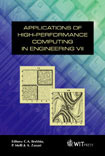Parallel Finite Element Algorithms For The Analysis Of Multiscale Plasticity Problems
Price
Free (open access)
Volume
27
Pages
Published
2002
Size
566 kb
Paper DOI
10.2495/HPC020081
Copyright
WIT Press
Author(s)
K. Inal, K. W. Neale & P. D. Wu
Abstract
Parallel finite element algorithms for the analysis of multiscale plasticity problems K. Inal1, K. W. Neale1 & P. D. Wu2 1Faculty of Engineering, University of Sherbrooke, Sherbrooke, Quebec, Canada. 2Alcan International Limited, Kingston R&D Centre, Kingston, Ontario, Canada. Abstract Parallel computing algorithms for the finite element method have been developed to simulate multiscale large deformation plasticity problems. Due to the nature of these problems and the computational methods involved, different parallel computing techniques must be employed for the Taylor-type crystal plasticity (TFE) and the so-called \“finite element per single crystal” (FESC) models. For the FESC model, the global stiffness matrix is formed in parallel and a parallel solver employing a number of Krylov iterative methods is used to solve the systems of equations. For the TFE model, a data parallel implementation technique is employed. This technique provides a large reduction in the storage required on a single processor and thus allows for an effective solution of computationally demanding crystal plasticity problems. The efficiency and the performance of the parallel finite element models that have been developed are investigated by comparing simulations performed on an IBM POWER3 SP parallel supercomputer. 1 Introduction Metal forming has, for a long time, been an important processing operation. In many manufacturing areas such as the automotive, aerospace, packaging and electronic industries, the optimization of metal processes has become a key factor to reduce product development time and final cost. In general, metal forming involves large strains due to stretching, drawing, bending or various combinations of these basic deformation modes. From the view point of
Keywords




